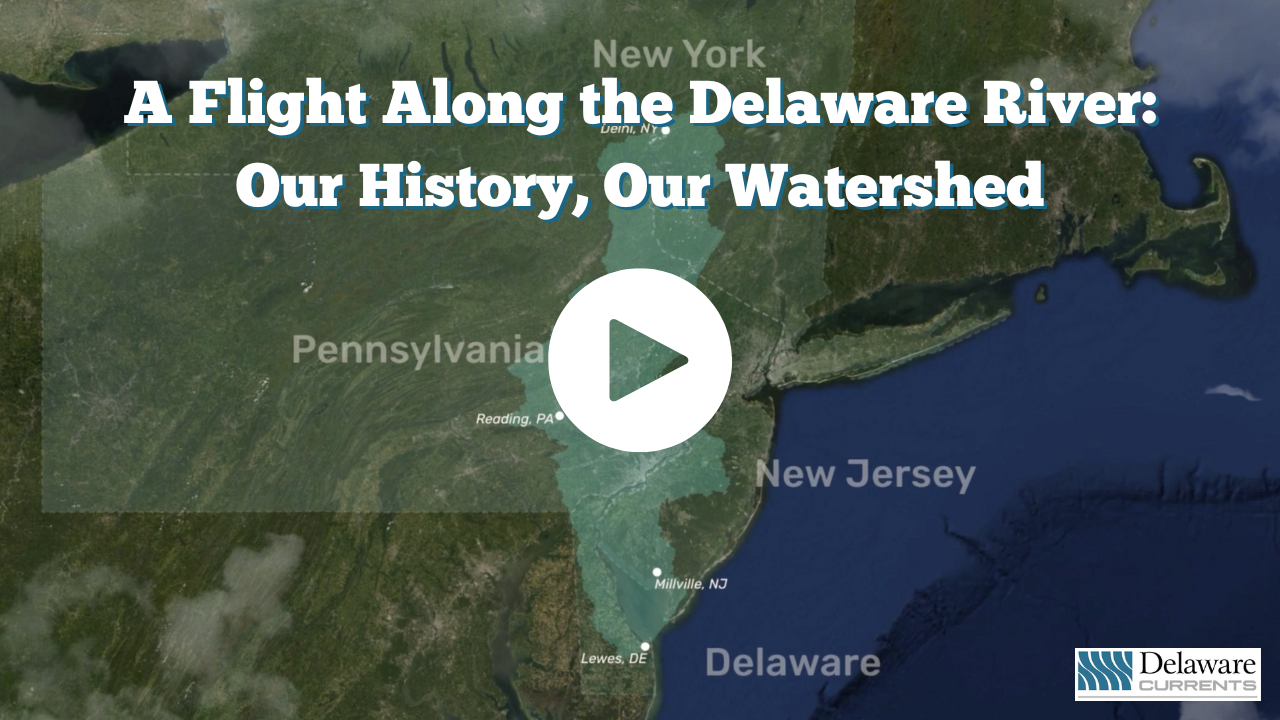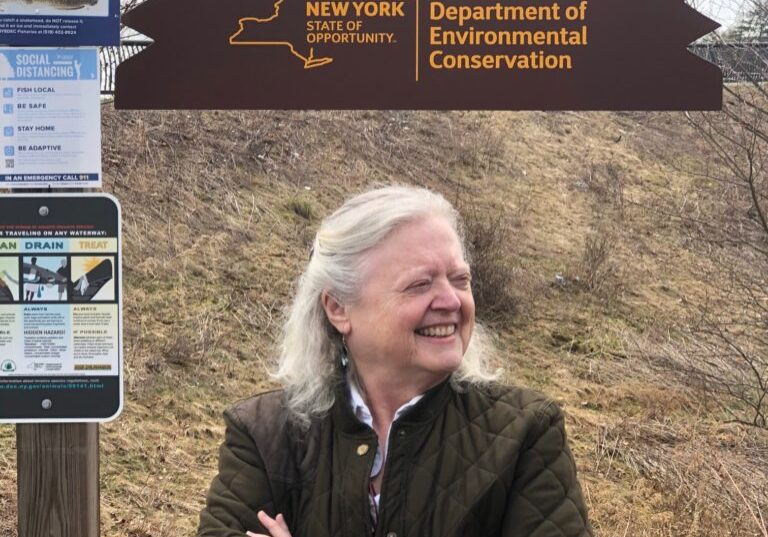
‘If we forget our connection to the natural world, the real world, we are lost as a society, a nation and a species’
| October 3, 2023
This is a speech given by Fred Kowal on Sept. 27 at the Coalition for the Delaware River Watershed annual forum, held this year in Wilmington, Del. He is on the board of the National Wildlife Federation and also president of United University Professions, a union representing faculty, professional staff and healthcare workers of the State University of New York. That union has, he said, “broadened our work to encompass social justice and environmental protection.”
I will be focusing on the National Wildlife Federation, given my role in that fine organization — one that I am honored to serve as a member of the Board of Directors. But more importantly, I hope that I can convey the perspective that we need urgently to step outside of ourselves as individuals and also to step outside of ourselves in terms of the organizations we represent. The times are that urgent; the challenges that immense.
As a way of introduction, I will share with you that I am no stranger to the Mid Atlantic Coast.
I remember vividly my trips to Assateague National Seashore while I was living in DC, to swim in those pristine waters in my 20s, even as early as April, loving the cold, crisp sea.
Then, a couple decades later, playing in the beaches of the Jersey Shore at Island Beach State Park with my two sons. No surprise, that our family has a great love of the sea.
I have a to thank my parents who gave me my first ocean experience and my first national park experience at the almost brand-new National Seashore on Cape Cod, Mass.
Given that last reference, it’s appropriate that I offer the following from President Kennedy: “We are tied to the ocean. And when we go back to the sea, whether to sail or to watch it we are going back from whence we came.”
If we forget our connection to the natural world, the real world, we are lost as a society, a nation and a species.
If that is a principle by which all of us must live and all organizations must be guided by, then it is appropriate that we examine what drives organizations like the National Wildlife Federation and all of us in this amazing coalition that meets here today to do what we do.
In my humble opinion, there is in all organizations a reason for being, generally driven by principles – at least we hope so. In my day in and day out work as president of United University Professions, one could distill the work and its reason for being as simply negotiating a contract and enforcing it. But in my work at UUP, now stretching to over a decade, reflecting the traditions of our union, reflecting who we represent – faculty, professional staff, healthcare workers in the State University of New York – we have broadened our work to encompass social justice and environmental protection.
With a focus on doing all that we can to turn back the climate crisis, we are serving not only our self-interest but more importantly, this work represents what a union is about. A central tenent of unionism is the belief that an injury to one is an injury to all. This does not just hold for workers in factory or a mine or a hospital or a classroom. It is also the case for anyone who lives upon Planet Earth in these days.
And so it is with the National Wildlife Federation.
We stand for something more than conservation of species, selected for their utilitarian purposes – or their cuteness. We have grown beyond that, to reflect the fact that we humans are part of an ecosystem that is global. As such, truly, what happens in one corner of the world, how resources are used, influences the lives of all of us.
So, we are here. At this important moment in the history of this species, challenged as never before, by the combined crises of the loss of biodiversity and the worsening climate crisis. Combined, they represent truly an existential and potentially cataclysmic threat to us all.
Over the weekend, I happened to have read an article written by a member of UUP, a faculty member at the SUNY College of Environmental Sciences and Forestry in Syracuse.
Dr. Robin Wall Kimmerer, who is a plant ecologist, a distinguished teaching professor and director of the Center of Native Peoples and the Environment at ESF. She is the author of Braiding Sweetgrass: Indigenous Wisdom, Scientific Knowledge and the Teaching of Plants.
Her op-ed in the New York Times focused on her work in the Adirondack Mountains of Northern New York and how she is witnessing the behavior of turtles changing. They now nest in higher locations than in the past. They are climate refugees.
And the challenge Dr. Kimmerer lays out for us two-leggeds, is not one that is simple nor easy to attain. As she writes: “We need more than policy change; we need a change in worldview, from the fiction of human exceptionalism to the reality of our kinship and reciprocity with the living world. The Earth asks that we renounce a culture of endless taking so that the world can continue.”
A good place to start on this difficult journey of change perhaps is to embrace the wisdom that many indigenous nations hold to, and one that I know of from the Haudenosaunee, the People of the Longhouse from the land we now call New York State.
Leaders of the six nations are taught that all their decisions are to be made considering their impact seven generations hence. That’s roughly 150 years. Can you imagine if decisions made 150 years ago by our leaders were made considering us here in 2013?
That’s 1870. Well, the president at the time, Ulysses S. Grant did sign the legislation that created Yellowstone National Park. Good step. Seriously underrated president, by the way.
Think of what has transpired since then, all of the exploitation and destruction, but also the rise of a true conservation movement and then eventually transitioning into an environmental movement with historic legislative and policy achievements that we all are fully aware of. As we think about the twin crises I mentioned earlier and the need to change how we see ourselves in this world, we should be proud of what we in the National Wildlife Federation have become and are in the process of becoming: the largest, most influential conservation and environmental organization in the world.
Central to our role, in all that we do, in my humble opinion, is to stop the dual crises of climate change and biodiversity loss from becoming cataclysmic. In order to do so, we must be focused intentionally on the reality of environmental injustice. Whether we are anglers or hunters, gardeners or hikers, kayakers or photographers — we all treasure what the natural world brings to our lives. Thus, the work we do must extend that pleasure, that liberation from the mundane, to all in our communities and our nation. But it’s more than just access to the wild.
To preserve the wild is wondrous and vital for the future of our species. But above all we must come face to face that our collective exploitation of the natural world has brought pain, suffering and death to untold millions since the rise of industrialization. And this is not something that is limited to the past.
It is happening in the here and now. It is especially the reality now that the United States is the largest producer of oil in the world and its biggest consumer of oil in the world. The work we do is the work of preservation, of justice, of life and it must be so if the future is to be one that is truly humane for all the generations that follow us — up to an including the seventh generation. It means that we must face the fact that we produce that which destroys lives and the living space of all life and we consume that which destroys lives and the living space of all life.
Success will not just be measured in square miles preserved from exploitation, in lives saved from early death caused by air and water pollution — or from viruses released from other species — it will be measured by the way we build a movement that grows beyond conservationists and environmentalists to include workers and the unions that represent them.
The right to collectively bargain is not just about getting a good contract. It’s also about promoting and defending the collective good. That collective good does not just include humans — especially those in communities of color who have borne the weight of the costs of environmental injustice. It also includes the species we share this planet with — including our grandmothers, the turtles. And this work demands that we find the way to form partnerships with diverse sectors of our society united for the common good.
The National Wildlife Federation is uniquely positioned to lead in these struggles. We hunt, we fish, we hike, we garden, we observe and study wildlife, we enjoy water sports, we camp — we enjoy the gift of the wild places more than most others. It is in this unique coming together of diverse elements of our society that we derive our strength that can forge the changes we must make if our society is to heal, for it is broken; if it is to become balanced with the world we inherited from our ancestors and borrow from our descendants; if we are to discover a future that is wondrous and whole — and just.


![DC_Image [Image 4_Assunpink Meets Delaware] meets Delaware The Assunpink Creek on its its way to meet the Delaware River. The creek passes through woods, industrial and commercial areas and spots both sparkling and filled with litter.](https://delawarecurrents.org/wp-content/uploads/bb-plugin/cache/DC_Image-4_Assunpink-meets-Delaware-1024x768-landscape-14f069364113da5e8c145e04c9f2367c-.jpg)




Kikayuyëmënaninkahke